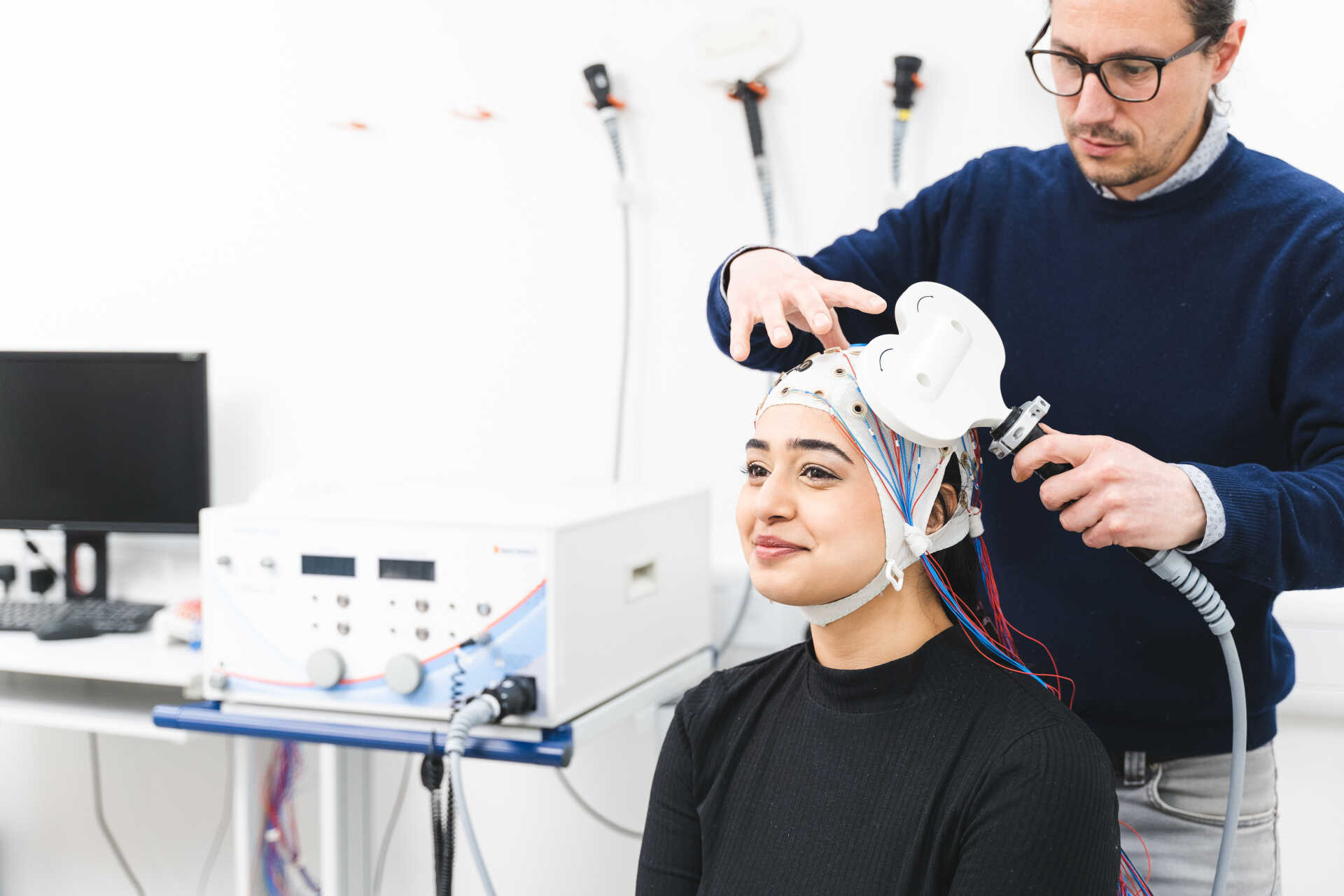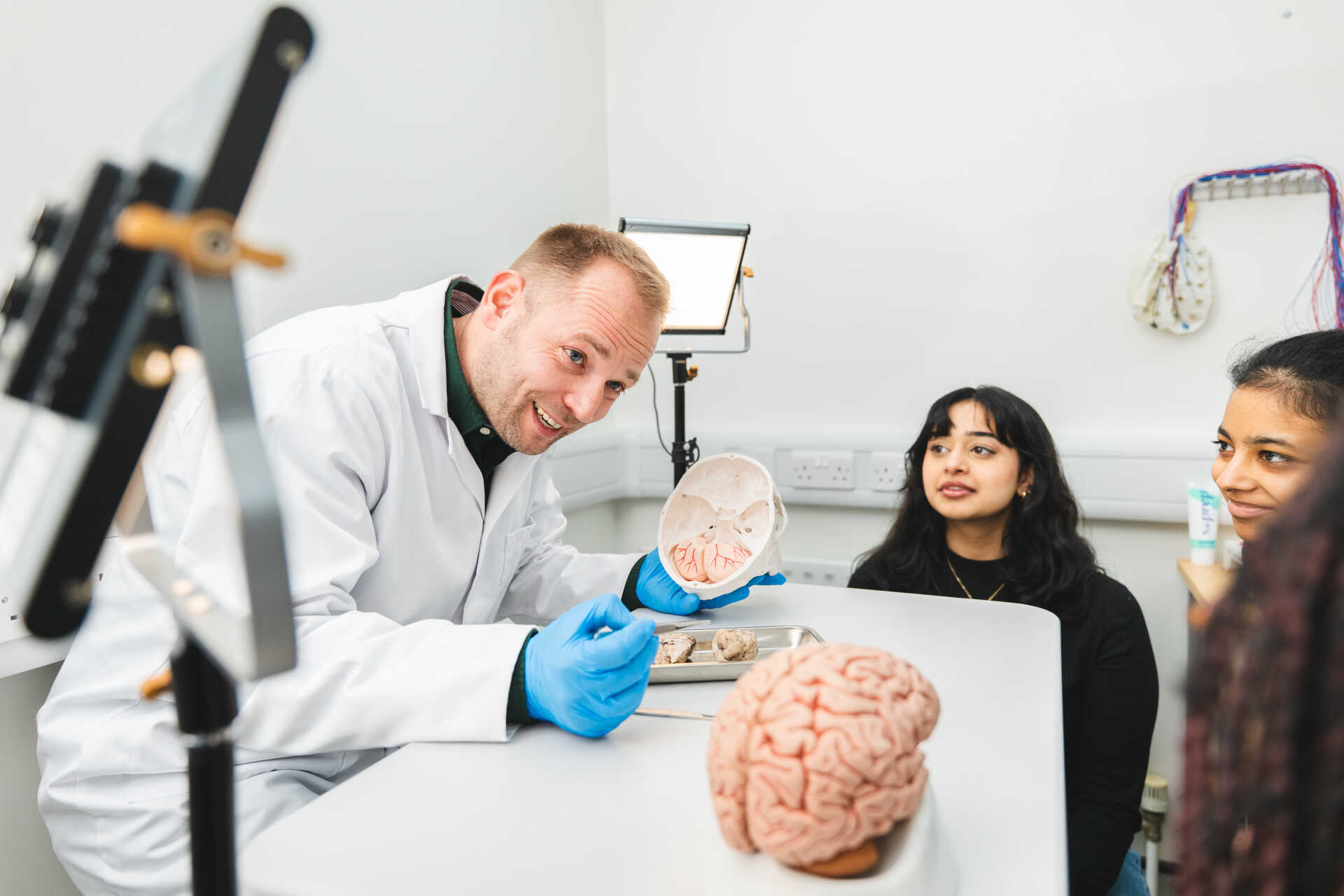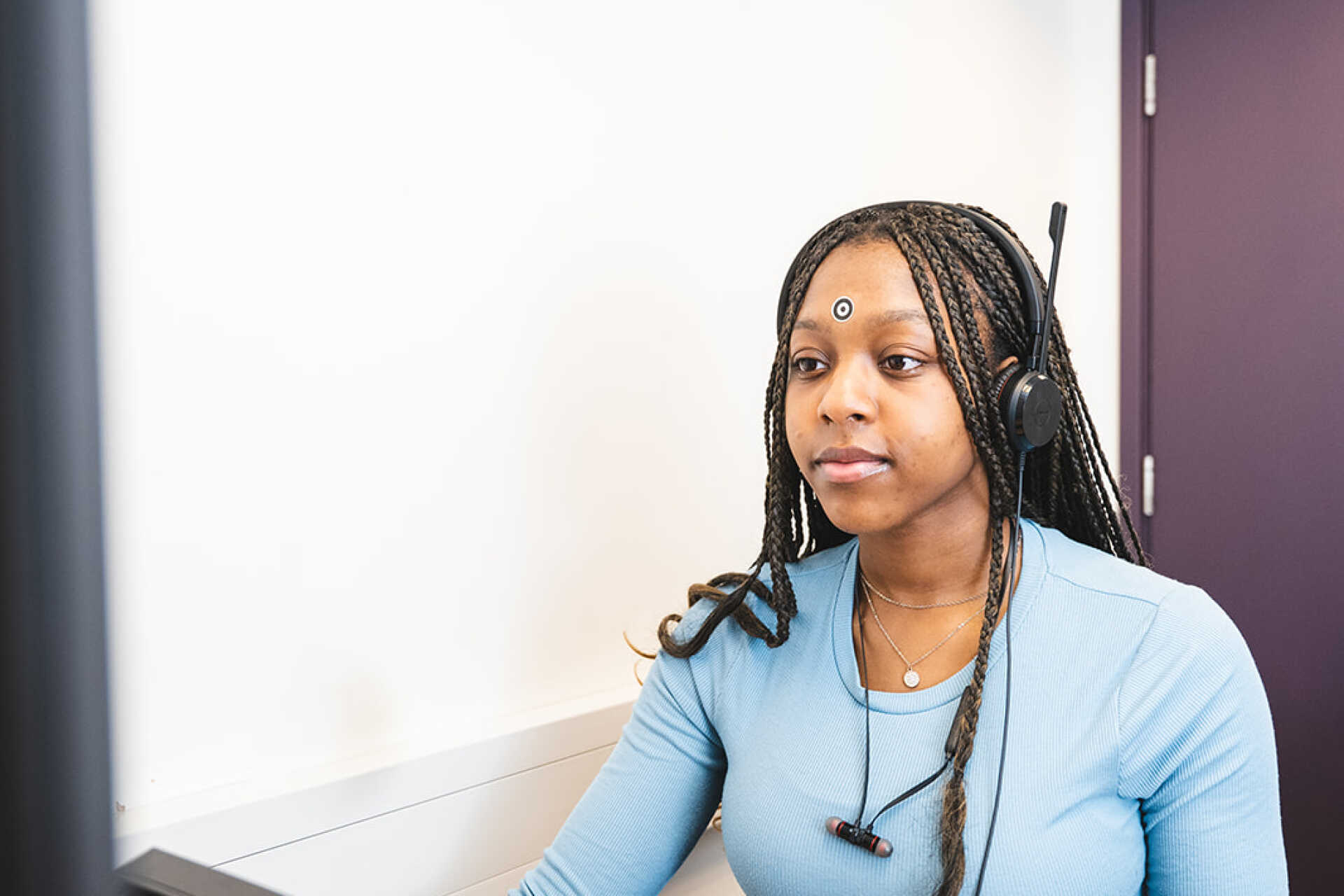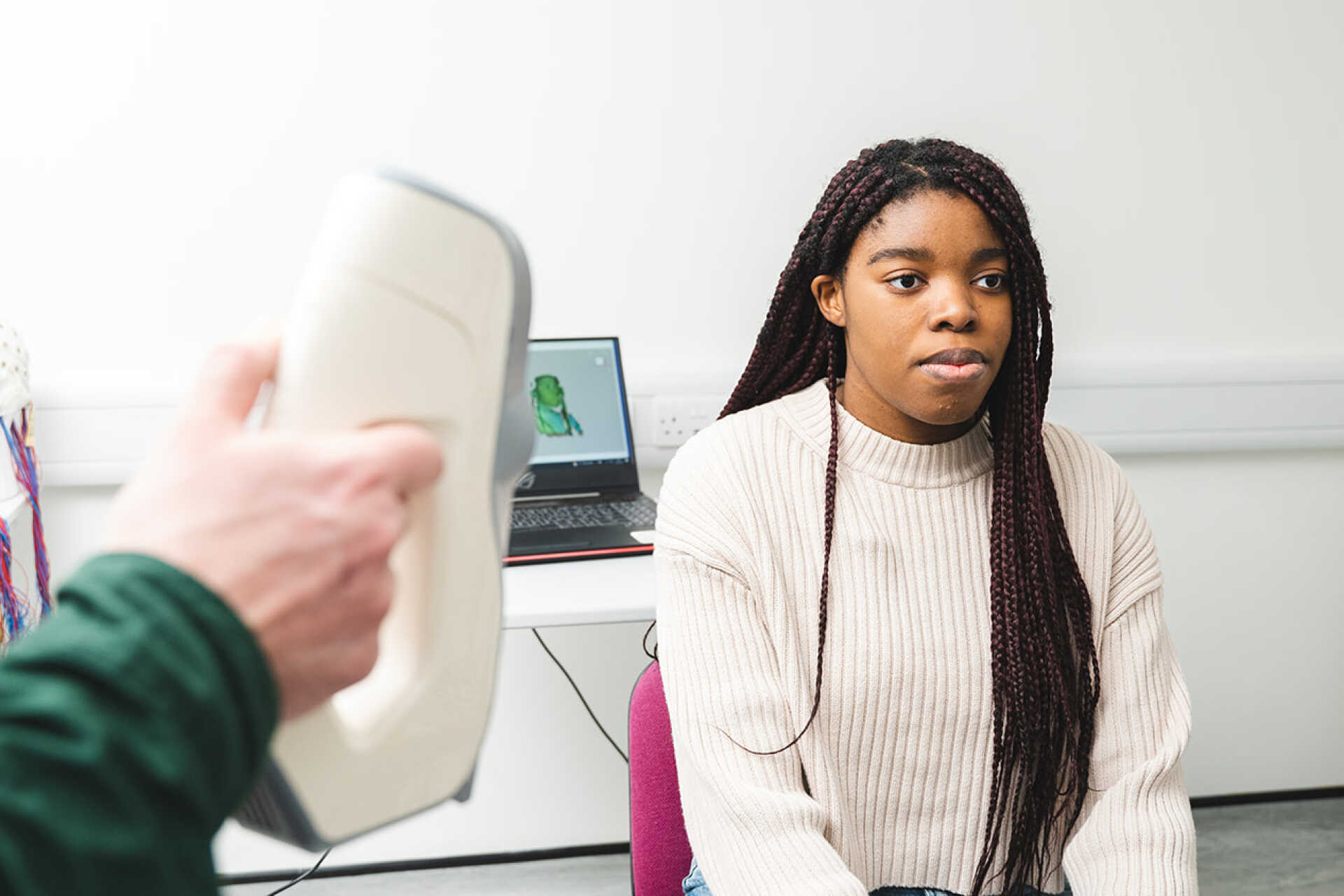
How do people think, perceive and feel? Psychology is the scientific understanding of human behaviour that opens doors to a wide range of careers, from clinical, business and forensic psychologist to social work and roles in marketing, public relations and human resources.
Our British Psychological Society (BPS) accredited degree enables you to confront the issues that humans face with psychology's scientific principles. From brain injury to prejudice reduction, child development to offending behaviour and rehabilitation. We provide you with the tools to develop interventions for hospitals, schools and businesses, making a difference to society through innovations in policy and research.

Gain practical experience of ongoing research projects or gain an insight into the workplace and the local community.
Kent ranked 16th for Psychology in the UK for graduate prospects in The Complete University Guide 2023.

Test out your own theories and hypotheses in our excellent facilities, including brain stimulation and virtual reality laboratories.
We have 25 years’ continuous accreditation by The British Psychological Society.

The University will consider applications from students offering a wide range of qualifications. Click below to find out more. Please also see our general entry requirements.
AAA-AAB excluding General Studies and Critical Thinking
Distinction, Distinction, Merit
34 points overall or 17 points at HL with Mathematics 4 at HL or SL
Mathematics grade C or 4
Pass all components of the University of Kent International Foundation Programme with a 65% overall average (plus 50% in LZ013 Maths and Statistics if you do not hold GCSE Maths at 4/C or equivalent).
The University will consider applicants holding T level qualifications in subjects closely aligned to the course.
The University welcomes applications from Access to Higher Education Diploma candidates for consideration. A typical offer may require you to obtain a proportion of Level 3 credits in relevant subjects at merit grade or above.
The following modules are offered to our current students. This listing is based on the current curriculum and may change year to year in response to new curriculum developments and innovation:
You take three compulsory modules and then choose two optional modules from across the University. The School of Psychology offers the following two option modules: SP306 Introduction to Forensic Psychology and SP311 Business Psychology: An Introduction.
SP300 is concerned with methodology in psychology, with statistics in psychology, and how they interact. In the lectures, relevant topics in methodology and statistics are introduced over the course of the year (examples are design considerations, counterbalancing, sample versus population, descriptive statistics, histograms, summary statistics, hypothesis testing). There are a number of dedicated lectures looking at how the psychological literature reflects the methodological and statistical issues that have been addressed in the lectures, and how researchers have balanced the requirements of methods, statistics and theory-driven investigation
This module provides students with an introduction to the methods, techniques and issues of cognitive and biological psychology. The module covers the historical development of cognitive psychology as a science, the brain processes which underlie human behaviour and behavioural genetics. The module focuses on the cognitive processes of learning, thought, perception, memory, attention, intelligence, psychopathology and disorders of cognition. Each topic includes a brief overview of its historical development before introducing students to the current theories, methods and issues. The module is taught through lectures and the accompanying psychology specific skills seminars.
This module, along with other Stage 1 psychology modules, provides a foundation for Stages 2 and 3. It will provide students with an introduction to the methods, techniques and issues involved in the study of social psychology and developmental psychology. The emphasis of the module is on theory as the foundation of an empirical discipline and the importance of scientific methodology. It highlights the interplay between theory, research, and application in both social psychology and developmental psychology. In one part of the module, focus is placed on core theories and research in, as well as applications of, social psychology. In the other part of the module, focus is placed on core theories and research in, as well as applications of, developmental psychology. Each part begins with an overview of the historical development of the subject before introducing students to current theories and methods.
The Research Participation Scheme (RPS) enables students commencing their training in Psychology to gain experience with academic research through participation in studies conducted by staff and other students who are more advanced in their studies (i.e., Final Year, MSc, PhD). Students enrolled in the RPS accumulate credits that correspond to the time spent participating in studies. All studies offered via the RPS have received independent ethical approval and comply with the BPS Code of Human Research Ethics.
This module will introduce students to key topics in Clinical Psychology. In particular, this module will focus on (1) fundamental applications of psychology, as a science, for understanding important clinical issues, and (2) key research methods common in clinical psychological research. Throughout the module, students will be encouraged to apply contemporary psychological concepts and methods to understand the important clinical psychological issues outlined.
This module will provide you with the fundamental skills needed to succeed in degree-level psychology. As well as explicit training in the mechanics of academic writing, referencing, and critical thinking, it will give you a thorough grounding in the psychology of effective learning, considering key topics from cognitive psychology (e.g. memory, attention) in terms of how they relate to successful study strategies.
This module will introduce students to key topics in Forensic Psychology including the development of offending, the rehabilitation of offenders, the criminal justice system, criminal statistics, policing, and the public response to crime. In particular, this module will focus on (1) fundamental applications of psychology, as a science, for understanding important forensic issues, and (2) key research methods common in forensic psychological research. Throughout the module, students will be encouraged to apply contemporary psychological concepts and methods to understand the important forensic psychological issues outlined.
You have the opportunity to select elective modules in this stage.
You take all compulsory modules. These modules, together with the final-year project, are required for professional recognition by the British Psychological Society.
The broad aims of the module are: (a) to provide a continued training in methodological skills appropriate to psychological investigation; (b) to provide advanced training in statistical techniques of the analysis of psychological data; (c) to provide training in computing skills for conducting analysis of psychological data; and (d) to provide direct experience of some of the phenomena encountered in other Stage 2/3 psychology modules.
The practical component of the module consists of a structured course of laboratory classes and non-laboratory sessions during which students work in small supervised groups designing and carrying out four research projects related to themes encountered in the department's other Stage 2/3 modules. A course of statistics lectures and computing workshops is closely linked to the practical classes. Computer–based statistical analysis is illustrated using R/RStudio, an open source statistical package.
The focus of this module is on understanding how children develop. Understanding something of the processes of developmental change is a central part of any psychology degree, and by the end of this module you should be in a better position to understand the significance of child development for human psychology. As the course progresses we will move from issues germane to early infancy, through childhood and the associated social, cognitive and emotional changes the child experiences during that period, concluding with an overall look at the bigger picture.
The Research Participation Scheme (RPS) enables students commencing their training in Psychology to gain experience with academic research through participation in studies conducted by staff and other students who are more advanced in their studies (i.e., Final Year, MSc, PhD). Students enrolled in the RPS accumulate credits that correspond to the time spent participating in studies. All studies offered via the RPS have received independent ethical approval and comply with the BPS Code of Human Research Ethics.
Students will attend a series of talks relating to topics in Clinical Psychology. They will be required to keep a reflective diary across Stage 2 where they record reflections on the series of talks. This allows the students to have a record of activities for their CV, contributes to employability, and gives practice for similar requirements at PG level or in pursuing professional training in Clinical Psychology
This module gives you grounding in methods, techniques and issues in cognitive neuroscience. It will focus on the biological bases of human behaviour, and on cognitive processes such as attention, perception, memory, and higher levels of cognition concerned with language and cognitive control, with a particular focus on how these processes are instantiated in the brain. Your will also learn about the methods used to study these processes, such as the recording of physiological signals, brain-imaging techniques, and the study of individuals with brain injury.
The module provides a comprehensive overview of the major theories and scientific discoveries in personality and individual differences, attitudes and social cognition, and the social psychology of group processes, interpersonal relationships and intergroup relations. It emphasises findings from systematic empirical research in both field and laboratory settings and focuses on key topics in classic and current research. Possible topics include mental abilities, emotions, self-esteem, the self, political attitudes, attraction, stability and change in personality and attitudes, social influence, leadership, social identity, prejudice, and prejudice reduction.
We will consider what personality is, why it differs between people, and what impact personality and individual differences have on life outcomes. We will also focus on the impact of perceptions of the self, others, and groups on attitudes and behaviour within close relationships, within groups and between groups.
This module will provide students with theoretical instruction and opportunities for critical evaluation in abnormal psychology. It will examine the origins and identification of different forms of atypical cognitions and behaviours and investigate the psychological and social impact for patients. It will cover some of the major mental health disorders, focusing primarily on what research has to say about their social/cognitive/biological bases and the implications they have for treatment. In addition, the module will describe several methodological approaches, ask fundamental questions about the meaning of normality. The historical developments in this field will be examined and current interventions and treatments will feature highly in this module.
You spend a year on placement within an organisation that delivers a form of psychological service, such as the National Health Service, Home Office, Department for Education or social services (subject to availability of placements and achieving an average mark of 60% at Stages 1 and 2).
The marks awarded for this year are based on performance on the placement, a Reflective Diary kept by the student (marked on a pass/fail basis), a poster presentation about the placement experience, and the report of a research project conducted while on placement. The research report and the Reflective Diary must be submitted before the autumn term of Stage 3.
In this year, students undertake a placement within an organisation relevant to an area of psychology, such as the Health Service, Home Office, Education Department or Speech and Language Therapy Services. Students may also undertake research placements, so long as the work is clearly relevant to psychology. During this time their work will be under the joint supervision of an academic member of staff and a supervisor within the placement setting. The placement is for a minimum of 30 weeks in duration, and typically starts in September. Students are typically on placement 4 days a week, and the fifth day is dedicated to completing coursework. Students on placement attend 'Back to Kent' days, when they return to the University and meet with one another, and the Director of Placements, to discuss their experiences.
You take all compulsory modules and then choose four optional modules, allowing you to follow specialist interests and benefit from staff research expertise.
The course introduces the concept of psychopathology and presents students with a range of models currently used in clinical research and practice to understand and treat psychological problems. It provides opportunities for exploring ways in which specific problems such as anxiety, depression and schizophrenia are understood from medical, cognitive behavioural and systemic orientations, and encourages students to compare and contrast these approaches.
This module aims to help students develop an understanding of clinical psychology by exploring the theory behind the main theoretical orientations utilised by those in the field. Initially students will be introduced to the three main schools of thought: psychodynamic, cognitive-behavioural and systemic. Thereafter, more contemporary approaches and specific therapies will be presented. This module will help prepare students for the rich variety of psychological thinking in mental health and clinical psychology. This may be particularly relevant to aspiring clinical psychologists.
All students are required to carry out a piece of psychological research on a specific topic, and to then present it as a report that adheres to the conventions of academic Psychology.
This module complements the focus of BSc degree on basic (fundamental) psychological research by providing training in applied psychology. The module equips students with an understanding of what is meant by applied psychology, of the domains in which psychology can be applied (e.g., in business, education, health, and the law), and decision rules governing applied psychology such as the balance between the cost and risks inherent in an intervention with its benefits. It would also introduce students to ethical, logistical, and methodological challenges in applied psychology. Students are also introduced to the history and philosophy of applied psychology, for example contrasting humanistic and behaviourist approaches to intervention, and a consideration of the role of socially constructed "value" in the application of science (for example, how prejudice versus homosexuality have waxed and waned as “problems” warranting psychological intervention according to prevailing social values).
The diversity and complexity of primate sociality is reflected in the diversity and complexity of their communication strategies. This module complements the module ANTB5800 (SE580) 'Primate Behaviour & Ecology' by examining the ways in which primates communicate with one another through olfactory, tactile, visual, and acoustic signals. We will address fundamental questions in animal communication including: Is it appropriate to characterize such communication in terms of information transfer? How does communication evolve? What maintains signal honesty, and under what conditions can deceptive communication can evolve? The module will cover the physical and biological bases of signal production and perception. We will explore the extent to which studies of primate communication can provide a window into their minds. Finally, we will delve into the question of the relevance of primate communication for understanding the evolution of human language.
Much of the material presented in this course forms part of the relatively new academic discipline of evolutionary psychology/anthropology. The goal of this course is to discover and understand the principles of evolutionary psychology and other complementary paradigms. The module explores human behaviour (primarily human sexual behaviours) from an evolutionary perspective. Topics covered are reproductive and mating strategies, parenting behaviour, kinship, cooperation, survival, status striving, jealously, and aggression. The course will provide an excellent understanding of the deeply biological nature of human behaviour, and develop skills in critical thinking. Students will be encouraged to bring relevant questions and observations to seminars and time will be allocated to deal with them.
If behaviour has been shaped by natural selection, then those behaviours must have some biological basis. This module explores the extent to which hormonal mechanisms provide such a biological explanation of behaviour in humans and our primate cousins. Students will learn the basics of the endocrine system, and consider both how hormones affect behaviour and how behaviour may affect hormones. This module will examine the role that hormones play in the differentiation of behaviours between females and males, as well as the evidence that sexual, parental, aggressive, and affiliative behaviours are influenced by hormones. Students will thus complete this module with a greater appreciation of the hormonal underpinnings of the complex sociality that characterizes humans and other primates.
The module introduces students to behavioural economics, which combines economic analysis with insights from psychology to understand human behaviour. It will start by briefly presenting the classical model of rational, selfish economic agents, outlining limitations of this model in predicting and explaining behaviour. Thereafter, it will introduce students to models which relax assumptions of the classical model, incorporating insights from psychology instead, and cover evidence on the power of these behavioural models in explaining human behaviour. Finally, it will cover the implications of these models for the design of public policy.
This module tackles a variety of hot and/or critical topics in cognitive psychology, building upon the theories and research assimilated at Stages 1 and 2. The goal of the lecturers, all experts on their topics, is to bring students to a more advanced level, where they can start to evaluate pieces of research in terms of their findings, conceptual underpinnings and/or methodological choices. The overarching theme focuses on free will and metacognition, looking in particular at the extent to which we control, or feel we control, our cognitive processes and behaviour in areas such as decision making, imitation and memory. We will discuss research that has used a variety of methods, including behavioural, animal and neuroimaging techniques. Practical applications and relevance to a general understanding of behaviour will be emphasised throughout.
Developmental psychology aims to understand the developmental trajectory of psychological processes involved in human thought, action, behaviour and emotion. The underlying premise of this field is that a fuller understanding of any psychological phenomena becomes available once we explain when and how it develops. The main purpose of this module is to critically review recent research into key topics within advanced developmental psychology (e.g. social development, the development of prejudice, children as witnesses, the development of mindreading and learning from others). Through such an examination we will be a good position to understand the questions, issues and controversies that are at the forefront of research in developmental psychology.
This module provides an introduction to important issues in learning disabilities. It examines definitions and attitudes to people with for example, Down's Syndrome. It explores a number of particular difficulties which people with learning disabilities experience, including communicating, establishing social and sexual relationships, and some of the resultant problems, such as sexual abuse and challenging behaviour. Finally, the most recent social policy initiatives are considered with a focus on how services might implement policy objectives (such as social inclusion and adult protection).
This module involves students in a project based on interviews with people with learning disabilities. There will be teaching sessions on research, interview construction, recording and analysis. Practical work will involve visiting a person with learning disabilities at their place of work and conducting a recorded interview with due regard to ethical and consent issues. A series of clinics designed to assist students in analysis, interpretation and presentation of the project work will follow. The module will conclude with students doing a group presentation of their findings to people with learning disabilities, staff in learning disability services and other invited guests.
This module offers an exciting opportunity to learn more about cutting-edge research into groups. You will understand and apply group research to social policy, business, politics, marketing, etc. and get the chance to consider current affairs and personal experiences with the opportunity for small group discussions and team work. Example topics: decision-making in groups, alcohol and group processes, leadership, organisational identity, improving cooperation in groups.
This module provides an opportunity to study the literature on motivation, inspired by a wide range of psychological perspectives (e.g., Evolutionary Psychology, Social Psychology, and Existential Experimental Psychology). In this, we will consider what motivates human cognition and behaviour. Specifically we will consider; (a) General Theories of Human Evolution & Motivation(b) Biological Perspectives (c) The self and Self-regulation (d) Human Mating Strategies, (e) Embodiment, (f) Threat Management, (g) Emotion, (h) Religion and Illusion, (i) The Modern Unconscious (j).. Moreover, the module will introduce students to experimental methods and measures applied in the field of research on human motivation. Finally, applications of theory and findings on human motivation to applied settings (e.g., daily life) are discussed
This module will build upon the cognitive theories and research methods explored at stages 1 and 2. It will focus on several forms of neurological deficit each of which affects a different domain of cognition. Students will learn about how different strands of neuroscientific research, relating to behaviour, cognition, anatomy, and physiology, have both advanced our understanding of human neuropsychology, and informed on the design of relevant intervention strategies.
The module will systematically explore common logical and psychological barriers to understanding and critically analysing empirical research. Major topics to be considered include common fallacies of deductive and inductive reasoning, judgmental heuristics relevant to evaluating empirical research claims, essentials of a scientific method, misleading statistical and graphical techniques, establishing genuine associations, the role of inferential statistics for identifying illusory associations, essentials of causal inference, threats to the validity of experimental and non experimental research.
This module will provide students with an in-depth examination of the theoretical and applied aspects of Forensic Psychology. It will include the development of laws and the principles on which the judicial system is founded, offending by specific sections of the community including street gangs and career criminals, Criminal Justice responses to offending by the police and forensic profilers, the role and credibility of eyewitnesses and the interview processes employed with suspects, the role of juries, how sentences are compiled for convicted offenders, the aims of punishment and how prisoners respond to imprisonment, theoretical perspectives of rehabilitation and an examination of the implementation of the sex offender treatment programme. The module will focus on the in-depth application of forensic psychology to the justice system, its role in identifying and ameliorating offending behaviour. In particular it will evaluate the role of psychology in criminal justice: systems, policies and practices by presenting and critically evaluating research and research methods within forensic psychology. Students will be encouraged to develop skills to critique the literature and methodologies to further their understanding of the core forensic issues the course presents.
This module focuses on imaginative cognition - the capacity for humans to mentally simulate other times, places, and possibilities outside the present. We will consider theoretical perspectives and debates on the imagination from a range of disciplines, and will examine how the imagination – whilst seemingly intangible – can be empirically quantified and studied. We will discuss the contributions of the imagination to people's decisions, actions, and beliefs. Teaching topics may include, but are not limited to, pretend play and imagination in childhood, counterfactual and future thinking, mental imagery, thought experiments, creativity, imagination in clinical populations, the neuroscience of the imagination, and imaginative cognition in other species.
This module will provide students with theoretical instruction and opportunities for critical evaluation in abnormal psychology. It will examine the origins and identification of different forms of atypical cognitions and behaviours and investigate the psychological and social impact for patients. It will cover some of the major mental health disorders, focusing primarily on what research has to say about their social/cognitive/biological bases and the implications they have for treatment. In addition, the module will describe several methodological approaches, ask fundamental questions about the meaning of normality. The historical developments in this field will be examined and current interventions and treatments will feature highly in this module.
This module focuses on practical aspects of applying psychology to work and organisations. The module combines teaching of conceptual frameworks with opportunities to engage in evidence-based practice through case studies, project work and/or participation in peer mentoring.
Modules are taught by weekly lectures, workshops, small group seminars and project supervision. The Psychology Statistics and Practical modules include laboratory practical sessions, statistics classes, computing classes and lectures in statistics and methodology.
Most modules are assessed by examination and coursework in equal measure. Both Stage 2 and 3 marks and, where appropriate, the marks for your year abroad or placement count towards your final degree result. Our assessment methods are varied and will include, but are not limited to, examinations, written assignments and essays, group work and oral presentations.
For a student studying full time, each academic year of the programme will comprise 1200 learning hours which include both direct contact hours and private study hours. The precise breakdown of hours will be subject dependent and will vary according to modules. Please refer to the individual module details under Course Structure.
Methods of assessment will vary according to subject specialism and individual modules. Please refer to the individual module details under Course Structure.
The programme aims to:
You gain knowledge and understanding of:
You gain the following intellectual abilities:
You gain subject-specific skills in the following:
You gain transferable skills in the following:

Our graduates currently have excellent graduate employment prospects, working in clinical, forensic and occupational psychology or in allied fields related to therapy, teaching, or social work. Many work in communication-focused roles in marketing, public relations and publishing.
Jobs our students have gone on to work after a clinical degree at Kent:
The School of Psychology has valuable links with educational establishments, hospitals and prisons in the area, offering you the possibility of both visits and work placements. We also offer a Research Experience Scheme that gives you a taste of working within a research environment.
The 2023/24 annual tuition fees for this course are:
For details of when and how to pay fees and charges, please see our Student Finance Guide.
For students continuing on this programme, fees will increase year on year by no more than RPI + 3% in each academic year of study except where regulated.*
The University will assess your fee status as part of the application process. If you are uncertain about your fee status you may wish to seek advice from UKCISA before applying.
Fees for undergraduate students are £1,385.
Fees for undergraduate students are £1,385.
Students studying abroad for less than one academic year will pay full fees according to their fee status.
Find out more about accommodation and living costs, plus general additional costs that you may pay when studying at Kent.
Kent offers generous financial support schemes to assist eligible undergraduate students during their studies. See our funding page for more details.
At Kent we recognise, encourage and reward excellence. We have created the Kent Scholarship for Academic Excellence.
The scholarship will be awarded to any applicant who achieves a minimum of A*AA over three A levels, or the equivalent qualifications (including BTEC and IB) as specified on our scholarships pages.

We have a range of subject-specific awards and scholarships for academic, sporting and musical achievement.
We welcome applications from students all around the world with a wide range of international qualifications.

Student Life

Kent ranked top 50 in the The Complete University Guide 2023.
Kent Sport
Kent has risen 11 places in THE’s REF 2021 ranking, confirming us as a leading research university.

Accommodation